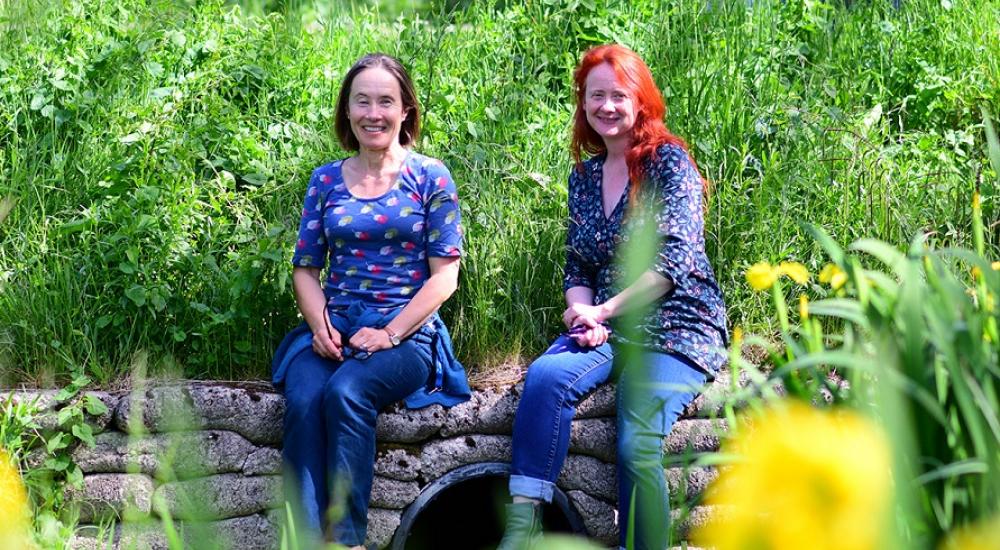Updating the non-statutory standards for SuDS could help drive a culture of delivering high value blue-green infrastructure
A standards update would help ensure that the multiple benefits of sustainable drainage systems (SuDS) in England are consistently recognised, promoted and delivered by industry stakeholders, according to our recommendations to the Department for Environment, Food and Rural Affairs (Defra).
Modifying the English Non-Statutory Technical Standards for SuDS (NSTS) could not only lead to surface water runoff being managed more effectively but also reduce pollution, improve climate resilience, and create and sustain better places for people and nature. We also believe that, alongside updated standards, water needs to be a central focus of masterplanning from the earliest stages, so that high value blue-green infrastructure can be effectively integrated throughout the fabric of the development and its landscape.
Our report, which presents the results of the Defra commissioned research, and which was also undertaken with support from CIRIA, McCloy Consulting, Illman Young Landscape Design, Balfour Beatty and Coleman Planning and Environmental, recommends that the current standards should be modified so that future sustainable drainage systems (SuDS) always deliver multiple benefits. By embracing SuDS principles when developing infrastructure, the negative environmental impacts of surface water discharges would be diminished, as pollution would be reduced and natural hydrological processes protected. The runoff would be used to create benefits for people by supporting functional and beautiful amenity and recreational spaces, promoting urban cooling, and creating local sources of harvested rainfall. Biodiversity would also see significant positive change through the use of runoff to create new and complementary habitats and ecological corridors.
Our proposals to Defra, which the government will use to inform its drainage policy development, are to replace current standards 1 to 6 with a new suite of six standards covering runoff destination, everyday rainfall, extreme rainfall, water quality, amenity and biodiversity. The inclusion of a standard focused on the management of everyday rainfall could be key to encouraging the integration of rainwater harvesting with drainage solutions, and the implementation of more SuDS components that are on the surface and use soils and vegetation, which in turn could drive the delivery of multiple benefits. We recommend that all the standards be applied using what we describe as “a SuDS approach”, and it is vital that developers and planners make sure that multiple benefit SuDS are integrated with the development planning process from the earliest stages. We also recommended that other relevant national policy and guidance such as the National Model Design Code and the Manual for Streets references, are aligned with the objectives and requirements of the standards to maximise outcome value.
We have recommended modifying the current hydraulic standards too, as the evidence we gathered suggested that the range of methods and design approaches currently leads to variability in allowable runoff rates and volumes and attenuation storage requirements and uncertainty for designers and approvers. To accompany revised standards, new consistent guidance is also needed on: acceptable runoff estimation methods and their application; areas to be used for pre and post runoff estimation; minimum flow control sizes and blockage risk management strategies; percentage runoff values for impervious and vegetated areas; and design rainfall, climate change uplift factors and urban creep.
“We believe that these suggested updates to the NSTS will support developers and local planning authorities in meeting the requirements of the NPPF in full,” said Bridget Woods-Ballard, HR Wallingford’s Project Director. “Our recommendations are a culmination of our ongoing research at HR Wallingford, as well as insights and expertise from our partners, support from a large and vocal project steering group, and extensive engagement with industry, which took the form of surveys, workshops with focus groups and stakeholder interviews. All of these activities took place online due to COVID restrictions, but were well attended and reflected the level of interest in this project. Those who engaged with the project were overwhelmingly in favour of updating the standards and we believe that our recommendations address stakeholder needs in a pragmatic and usable way.”
The report, research summary, research slide pack and dissemination video are available here.

Want to know more?
Further information
